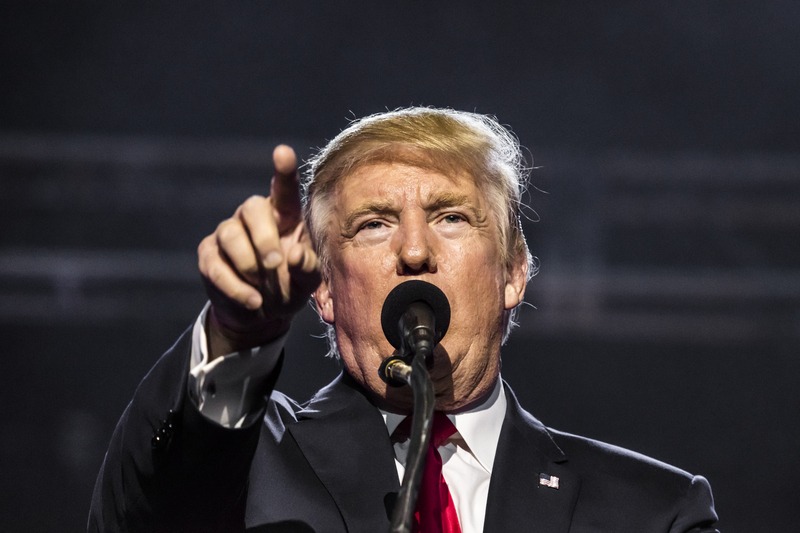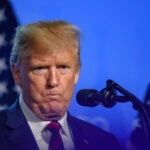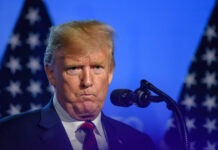President Donald Trump suggested Monday that many Americans might want to live under a dictatorship while defending his expanded federal law enforcement operations in Washington, D.C., though he insisted he does not want to be a dictator himself.
In late 2023, during an interview, Trump said he wouldn’t be a dictator—“except for Day One” of his next administration.
Speaking to reporters in the Oval Office on August 25, 2025, before signing new executive orders related to crime reduction, Trump addressed criticism of his administration’s military deployment in the nation’s capital. Trump stated that “a lot of people are saying maybe we’d like a dictator,” while immediately adding that he does not like dictators and is not one himself.
The president’s comments came three weeks into his federal takeover of Washington, D.C., which has involved deploying approximately 1,000 National Guard troops to patrol the streets alongside police and FBI agents. Trump signed executive orders Monday directing Defense Secretary Pete Hegseth to establish specialized National Guard units to assist with civil disturbances and boost public safety when circumstances require it.
The new executive order also authorizes Attorney General Pam Bondi to unwind metropolitan police orders in Washington if she believes they impede the administration’s crackdown. Federal agencies will receive expanded power to surge additional officers into the capital, potentially adding to the thousands of troops already deployed.
National Guard members in the capital will begin carrying standard-issue M17 pistols, with some equipped with M4 assault rifles. The guards have been authorized to use their weapons for self-protection and as a last resort when facing imminent threats. Trump indicated he wants Congress to codify these changes to make them legally binding.
The president has set his sights on expanding similar operations to Democratic-led cities, including Chicago, Baltimore, and New York. Trump noted that while guards are ready for deployment, he would prefer to be asked to intervene rather than impose federal control without local request.
Illinois Governor J.B. Pritzker responded that the state has received no federal requests for assistance and made no requests for intervention. Pritzker accused Trump of attempting to manufacture a crisis and politicize uniformed service members. Chicago Mayor Brandon Johnson characterized the potential deployment as a flagrant constitutional violation and military occupation of American cities.
Trump also signed an executive order on Monday aimed at ending cashless bail systems, which allow judges to release suspects without posting bond. The order targets jurisdictions maintaining such policies with potential consequences, including revocation of federal funds. Trump specifically criticized Illinois for its cashless bail policy as an example of problematic practices.
Additionally, the president signed an executive order criminalizing flag burning, imposing up to one year of jail time for the act. This directly contradicts existing Supreme Court precedent protecting flag burning as First Amendment expression.
Critics have drawn comparisons between Trump’s actions and authoritarian tactics used in Germany during the 1930s. Major General Randy Manner, former acting vice chief of the National Guard Bureau, told CNN that the deployment of military units to watch citizens on streets reminded him of that historical period.
Vice President JD Vance defended the administration’s approach, arguing that Democratic governors are more upset about federal offers of assistance than about crime in their cities. Vance claimed that murderers have been running roughshod over cities for decades while Democratic leaders focus on criticizing Trump’s interventions.
Daily protests have continued across Washington in response to Trump’s federal takeover, with residents viewing it as a manufactured crisis designed to expand presidential authority to other cities. The president celebrated what he described as 11 consecutive days without homicide in Washington, though police statistics show the city had several similar stretches earlier in 2025, including periods in late February and March.
Polling data suggests significant Republican support for expanded presidential powers. A University of Massachusetts Amherst survey found that 74 percent of Republicans endorsed Trump’s previous comments about wanting to be a dictator for one day. Other polls show majorities of Republicans believe Trump should face fewer constraints from Congress and courts, with substantial minorities endorsing unchecked presidential power.
When asked about the duration of troops in Washington and preparations for Chicago deployments, Trump avoided direct answers, instead telling reporters that he really wants to be appreciated for his efforts to address urban crime.
However, in Washington, D.C., the National Guard deployment is not concentrated in neighborhoods with high crime rates. Instead, they are primarily stationed at government buildings, tourist areas, and transit hubs—with minimal presence in the communities where elevated crime typically occurs.
Numerous credible sources document Trump expressing admiration for several authoritarian figures:
- Kim Jong Un: Called him a “super well‑adjusted dictator.”
- Saddam Hussein: Praised his ability to kill terrorists without due process, saying he “did that so good.”
- Vladimir Putin, Xi Jinping, Viktor Orbán: Described them as respected, strong leaders.
- John Kelly, Trump’s former chief of staff, said Trump told him Hitler “did some good things” and that Trump “would love to be” a dictator; he also claimed Trump “prefers the dictator approach to government.”
- The Atlantic reported that Trump admitted that he “needs the kind of generals that Hitler had.









